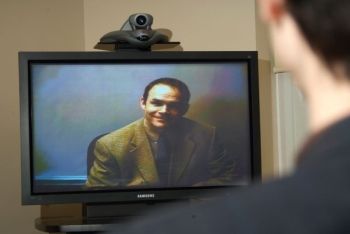
Publisher:
Bonnie King
CONTACT:
Newsroom@Salem-news.com
Advertising:
Adsales@Salem-news.com

~Truth~
~Justice~
~Peace~
TJP
Feb-14-2008 17:59

 TweetFollow @OregonNews
TweetFollow @OregonNews
Video-Conferencing Equipment Helping Forensic Scientists in Court and the Lab
Salem-News.comThe use of high technology video information systems can eventually reduce a large amount of time, police say.
 Use of video testimony is dependent not only on the availability of the technology but also on approval of the court, prosecution, and defense. During a trial, people have to be able to see and hear each other in real-time. This remotely controlled system can move the camera to show images, individuals, evidence or other items related to the trial. Photo: Oregon State Police |
(PORTLAND, Ore.) - Finding new ways to help do our jobs more efficiently and effectively is something all companies and organizations value, and it is no different in the world of forensic services where scientists spend hours analyzing evidence used to determine guilt or innocence.
The Oregon State Police Forensic Services Division is finding that video technology is helping keep forensic scientists on the road less and in the labs more performing critical scientific analysis.
The Forensic Services Division provides Oregon's only full service forensic laboratory system. Analysts provide technical assistance and training, evaluate and analyze evidence, interpret results, and provide expert testimony to the full spectrum of physical evidence recovered from crime scenes.
Six regional laboratories in Bend, Central Point, Ontario, Pendleton, Springfield, and Portland were strategically placed to provide timely crime scene response and help to law enforcement agencies around the state.
"We are committed to providing the highest quality scientific analysis to the criminal justice system," said Randy Wampler, Operations Manager of the OSP Forensic Services Division.
"But in order to do that we have to be available to testify in courts spread out among our 36 counties, and that requires many hours, and sometimes days, of travel to testify."
Video-testimony systems are proving to be an effective way to keep forensic scientists in the lab more and on the road less by allowing them to testify in court without having to travel there in person.
Seven complete packaged systems were purchased with a DNA Capacity Enhancement Grant at a cost of nearly $11,000 per unit.
In May 2007, the systems were installed in each regional laboratory and the division's Salem headquarters location.
"At the Portland crime lab, six testimonies have been given over the Video-testimony system to courts in Crook, Clatsop, Deschutes, Union and Hood River counties.
Some of these locations may require a full day or two of travel, not including the time spent in court," said Forensic Scientist Justin Lazenby, who works out of the Portland Metro Forensic Laboratory and was the driving force behind the idea.
"Time not spent on the road means time spent in the lab doing crucial analytical work needed for other investigations."
In addition to the cases in which actual testimony has been provided, numerous trips have been saved related to canceled trials or testimony given when the analyst was unable to get to the court because of weather or other factors.
"Trials often get reset or plead out on the morning of the trial, but if they don't then we have to be present and waiting to testify. There are numerous instances of trials where video testimony was approved, and then the trial was called off, saving substantial drive time that would have otherwise just been wasted," said Lazenby.
Other benefits noted through using the equipment include:
* Being able to provide sudden testimony without having to stop work and drive to and from the court location to testify
* Holding meetings with participants from each regional laboratory location
* Presenting or receiving training classes
* Availability of equipment for other division or Department uses in urgent cases or during an emergency
The cost for the Polycom model VSX 7000s systems includes the camera/computer, monitor, cart, installation, training and shipping. Each system is able to link to similar systems installed in 30 of Oregon's 36 circuit courts.
Use of video testimony is dependent not only on the availability of the technology but also on approval of the court, prosecution, and defense.
During a trial, court attendees and those giving testimony are able to see and hear each other in real-time.
The remotely controlled system can move the camera to show images, individuals, evidence or other items related to the trial.
The Forensic Services Division is a nationally accredited forensic laboratory system serving all state and local law enforcement agencies, medical examiners and prosecuting attorneys in Oregon.
The Division also performs forensic analysis on criminal cases for the defense upon a court order. More information about the Oregon State Police Forensic Services Division is available at oregon.gov/OSP/FORENSICS/index.shtml. Source: Oregon State Police
Articles for February 13, 2008 | Articles for February 14, 2008 | Articles for February 15, 2008






Terms of Service | Privacy Policy
All comments and messages are approved by people and self promotional links or unacceptable comments are denied.
Henry Ruark February 16, 2008 2:08 pm (Pacific time)
Effective use of specialized working and investigative skills demands the very best tools. So also does delivery of those results to where they can count the most: The court system. This use of the most modern technology to do so, and an effort to make sure it is kept up to date and capable of more advances as they occur, is an example of wise decision in our agencies. It is also a stunning disclaimer for those who will always complain that government cannot do anything, and do it right. There ARE some things that effective goverance can do for us that we cannot ever do for ourselves --this is an example and should be noted for that.
[Return to Top]©2025 Salem-News.com. All opinions expressed in this article are those of the author and do not necessarily reflect those of Salem-News.com.